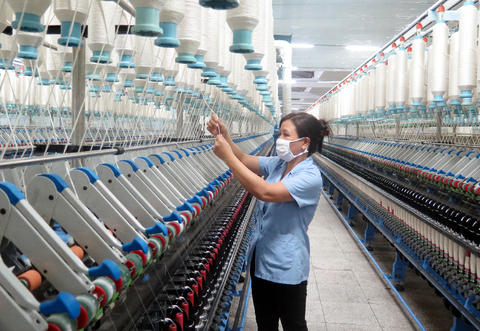
A production line of the State-owned Nam Dinh Textile Garment Corp. After 30 years of reform, the number of SOEs has been reduced to around 500. — VNA/VNS Photo Hien Hanh
A revision in the concept of state-owned enterprises (SOEs) could add 1,282 joint stock companies into the category of state firms and make them subject to the Law on State Enterprises, according to Phan Duc Hieu, vice director of the Central Institute for Economic Management (CIEM).
According to the law, state enterprises are economic organisations where the state owns the entire charter capital or holds dominant shares or paid-up capital, Hieu said at a conference discussing the revised draft of the Law on Enterprises on July 15.
A government report released last October showed Viet Nam has 526 SOEs in which the state holds 100 per cent of charter capital and 294 joint stock companies with capital contributed by government agencies.
However, data from the General Statistics Office (GSO) revealed that the country has 1,204 wholly state-owned companies and 1,282 with government agencies holding over a 50 per cent stake.
This would turn these 1,282 companies into SOEs in case of a new definition of the concept of SOEs, Hieu said.
The CIEM’s report revealed four options determining the concept of state firms in the Law on Enterprises, including those with the state holding 65 per cent of charter capital and having full control of their operations.
In the second option, enterprises have 50 per cent of charter capital owned by the state and they have to seek government approval on critical issues to their operations.
The third option defines SOEs as having 35 per cent of charter capital under state control, and the government has voting rights on the vision of the enterprises.
The last option only needs enterprises to have state capital, regardless of the amount, to be considered as a state firm. However, the government would have the rights to appoint members of board and executives, as well as making major decisions of these enterprises.
Hieu said the option to take would depend on the sentiment of investors, urging the prevention of the case where private investors hold dominant shares but companies are still under state control, creating conflicts in corporate governance.
Experts at the conference urged a more cautious approach in making a new concept on state firms. After 30 years of reform, the number of SOEs has been reduced to around 500, while the new interpretation of the concept of SOEs would increase this figure significantly.
Hieu said major investors holding a 50 per cent stake in state firms may consider offloading their shares if the government still has control over these firms. — VNS